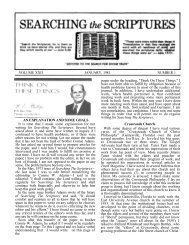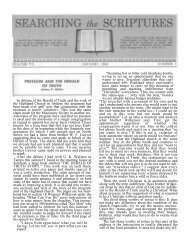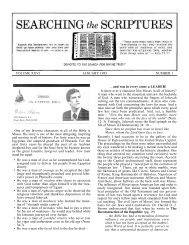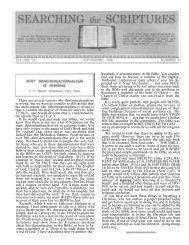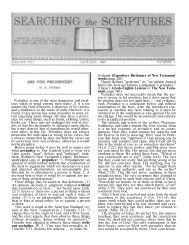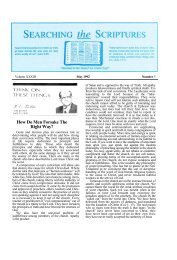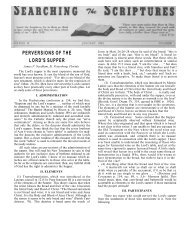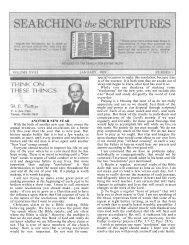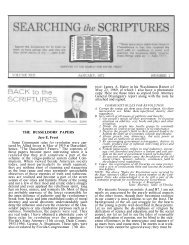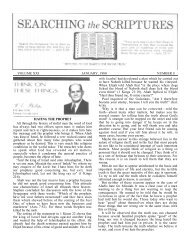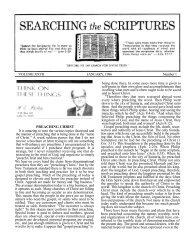Volume 31 – 1990 (PDF) - Searching The Scriptures
Volume 31 – 1990 (PDF) - Searching The Scriptures
Volume 31 – 1990 (PDF) - Searching The Scriptures
Create successful ePaper yourself
Turn your PDF publications into a flip-book with our unique Google optimized e-Paper software.
Page 8<br />
believe he has written the catechism that we must<br />
all recite. Furthermore, I'm confident that neither<br />
Brother Spears nor Brother Adams believes so either.<br />
But what Brother Adams said as quoted by Brother<br />
Spears will help illustrate a Point I was trying to make<br />
in my original article: "He affirmed that there are three<br />
categories of people who have a divine right to marry—<br />
(1) two single people, (2) two people where one or both<br />
of them have been the innocent party in a divorce<br />
involving fornication, and (3) two people whose mates<br />
have passed on to their reward. He concluded that<br />
beyond that he knew of no divine right granted to<br />
anyone for a second marriage. I don't know if Ken<br />
agrees with that fully, but I can truthfully state that I<br />
do. "<br />
I assume that the above categories would include<br />
any combination of such people, i. e. a couple<br />
consisting of one whose mate had passed on to his<br />
reward, and another who was single (which I suppose<br />
means never married), etc. With those assumptions<br />
understood — while I hate to recite the catechism —<br />
let me say that with my present understanding of<br />
Scripture, I too fully agree with that.<br />
So Dudley and I agree on that much, at least. May I<br />
wonder out loud if Connie agrees with it. He is quoted<br />
as saying it. But unless I am mistaken, he would not<br />
agree with the second point without further modification.<br />
<strong>The</strong> innocent party in a divorce involving fornication<br />
would not necessarily have a right to remarry, I<br />
think he would say. Not unless that innocent party took<br />
the initiative in obtaining the divorce.<br />
If this is the case, what shall we do, Dudley? Can you<br />
and I continue to have fellowship with Brother Adams?<br />
When he teaches that people whom we consider to be<br />
married should divorce, is he not putting asunder what<br />
God has joined together? And what shall he do with us<br />
who in his view are condoning adultery?<br />
Brother Spears says that I conclude "that each one<br />
of us should be content to believe whatever we want to<br />
believe about divorce. " I don't know where I concluded<br />
such a thing. That is his conclusion about what I<br />
believe, not mine. And may I kindly say that he jumped<br />
to the conclusion. I don't believe we should just be<br />
content to believe whatever we want to believe about<br />
any Scriptural subject, be it the Christian's participation<br />
in government, the eldership, the Lord's supper,<br />
baptism, or the matter of divorce and remarriage.<br />
Having noticed some points that do not properly<br />
represent my teaching, let's turn to the more important<br />
areas in which I believe Brother Spears falls short. He<br />
uses baptism for the remission of sins as a parallel to<br />
this subject and observes that there are many questions<br />
relating to it. <strong>The</strong> question, Dudley, is how you<br />
would treat a brother with whom you disagree on one<br />
of those questions. If someone asked you to baptize him<br />
in a stream of running water for conscience sake, would<br />
you accommodate him? Would you continue to fellowship<br />
him if he continued to believe that? I suspect you<br />
would do both. I know I would. If he continually pressed<br />
the matter and caused constant agitation over it, that<br />
would be another issue.<br />
Brother Spears has a simple answer as to what a<br />
marriage is. But such does not negate the fact that<br />
brethren disagree on some specifics in this area even as I<br />
indicated in my first article. I know of a situation in which<br />
a very young teen ran away and married and her parents<br />
had the marriage annulled. Now was there a marriage or<br />
not? Several years later she married another and is<br />
raising a family. I might have some ideas or even convictions<br />
on the matter but I for one am not going to demand<br />
that she divorce her present husband. I would fear I might<br />
be putting asunder what God has joined together. Neither<br />
am I going to assure her she's OK. She and her husband<br />
will have to decide that question.<br />
Brother Spears says, "... if we will limit our thoughts<br />
to what is revealed clearly, we will avoid the problems<br />
he sees. " Well, I just see some problems where I have not<br />
yet found the clear revelation, i can preach the<br />
principles about as well as anyone, and I probably teach<br />
what most of us believe to be the truth of Matt. 19: 9<br />
and related passages more than most. I am on call-in<br />
radio and TV programs a total of two and one-half hours<br />
each week and receive numerous questions on this<br />
subject. I teach what I believe the Bible plainly reveals.<br />
But again, I don't claim to know all the answers to all the<br />
problems I see.<br />
Dudley avers that "to put (the war question) in the<br />
same class as marriage, divorce, and adultery is not<br />
possible. " He states several reasons for this conclusion.<br />
For one thing, "they are not handled the same way in the<br />
Scripture, " we are told. Adultery is specified as grounds<br />
of excommunication, and God hates divorce; but<br />
"nothing even remotely like that is ever applied to<br />
governmental participation by God's people. "<br />
Now, while Dudley and I agree on the basic principles<br />
of divorce and remarriage, I think we need to be honorable<br />
with those who disagree. We need to keep our logical<br />
antecedents and consequents properly categorized. Pacifists<br />
believe that "governmental participation" in war or<br />
law enforcement is murder or may lead to it. Now looking<br />
at the matter from their point of view, is murder less<br />
serious than adultery? Is murder or the condoning of<br />
murder not grounds for excommunication? Doesn't God<br />
hate murder? A brother who disagrees with Dudley and<br />
me on divorce might say, "nothing even remotely like that<br />
is ever applied to marriage by God's people. "<br />
<strong>The</strong> difference in both instances is not whether adultery<br />
and murder are wrong, but whether these particular<br />
situations equal adultery or murder. My object in all this<br />
is not to condone adultery, but to at least cry out for a little<br />
consistency in the way we treat brethren with whom we<br />
disagree on some of these quite difficult questions.<br />
<strong>The</strong> scope of this article will not permit an analysis of<br />
Romans 14. Let me briefly state that I did not say; nor do<br />
I believe; nor does my statement on Romans 14 demand<br />
that "there can be no wrong position to take on anything<br />
over which good men of spiritual wisdom and unblemished<br />
reputation differ. "<strong>The</strong>re were some wrong positions<br />
being taken by some of whom Paul wrote in that chapter.<br />
I believe it is erroneous to conclude that "both sides are<br />
right, as far as the Almighty is concerned. " <strong>The</strong> subject of<br />
foods and days were both matters of divine revelation.<br />
Both sides were not right in their understanding.



